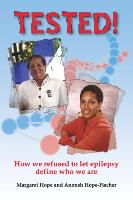Tested!
BücherAngebote / Angebote:
Once again, I congratulate my friends Margaret and Anoush for having the courage to tell their stories so eloquently, so movingly and so compellingly. I believe they should be read by every one of our physicians, health care givers, teachers (who so often have to assist pupils who haven't taken their tablets), patients and relatives.
Extracts from the Conclusion -
Professor Emeritus Sir Henry Fraser, K.A., MBBS, PhD, FACP, FRCP.
Skully's (Fred Skully author of "We licked our handicap") account aligns with the story that Margaret and Anoush relate in this gripping little book. They might not have "licked" their disability, but they have come close to doing just that. Both mother and daughter evoke a refreshing acceptance of their condition and demonstrate how every individual has to play the hand dealt to them.
With amazing candour, Margaret applies the journalism skills she learned as a junior reporter at The Barbados Advocate newspaper, while Anoush, the artist, applies deft strokes without air-brushing away any of the uncomfortable aspects of this malady. Her account of the numerous types of medication developed to help those
afflicted with this disease is encyclopaedic.
Margaret dips copiously into her family's background, citing its proximity to the Barbadian plantocracy and her love of literature through the nurture and tutelage of her revered journalist grandfather Charles Bransway Rock. (She has written another short book about him titled The Smell of Printer's Ink).
She takes the reader on a vivid odyssey through early childhood, growing up at Haggatt's Plantation, her first job, her sojourn in England, where she met and was mentored by the legendary C.L.R. James and his wife Selma, her marriage and children, and her acceptance of epilepsy as she arrives at the autumn of her years, with far fewer occurrences.
Daughter Anoush is equally accepting of the condition which she treats as more of a humbug to be got around than the disability that it is. Indeed, she has taken on the role of activist against epilepsy
Extract from Foreword by Carl Moore - Editor
The women approach the illness very differently. This may be due to their age difference and society's willingness to show more empathy towards people with different kinds of abilities. Margaret is more conformist, while Anoush is more pragmatic in her acceptance and approach. For example, they differ in the way they name the illness, Margaret describes herself as an epileptic, while Anoush views herself as someone who has epilepsy. Margaret feels victimised by the illness, Anoush is the survivor who does not give up fighting. This difference is evident throughout the telling of their stories.
Extract from Postscript by Dr. Patricia Rodney
Folgt in ca. 10 Arbeitstagen
